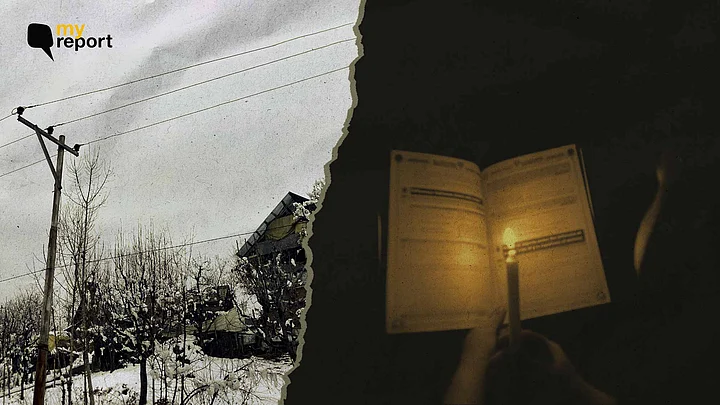“Decades ago, I used to study by candlelight. Today, my daughter does the same. There’s been no change in all these years – it’s heartbreaking."
Nazira's voice wavers as she speaks to me about the electricity outages in Tangmarg in Kashmir's Baramulla district where she lives with her 16-year-old daughter. A private school teacher, Nazira adds, "I want my daughter to exceed in her board exams, but I don’t see that happening."
In the middle of Chillai Kalan, the harshest stretch of winter from 21 December to 29 January, Kashmir transforms into a snowy wonderland that lures tourists from across the globe.
Yet, for the students, the bitter cold makes everyday life exceedingly difficult, especially because of the frequent power cuts that affect our studies on a daily basis.
“Our exams are scheduled for February, and it’s already so hard to study in this cold. But it's worse when you don't have electricity for 4-5 hours and sometimes more in a day. How can we prepare for our exams in darkness?” Shayan Bukhari, a Class 11 student from Srinagar, asks.
'Challenges Persist for Both Online and Offline Coaching'
For many students in the Valley, who rely on the more financially viable option of online coaching to crack competitive exams – as against moving to another city like Delhi or Chandigarh – frequent power cuts are particularly even more disruptive.
Hadiya Irshad, a Class 12 student from Srinagar, says, "Not everyone's parents can afford the fees of coaching institutes. So, online is a great option for us, but how can we do that without electricity?"
Jammu and Kashmir primarily rely on hydropower plants for electricity. However, during the harsh winter months, electricity generation reportedly drops to around 600-650 MW as against the peak demand of approximately 3,600 MW.
Even as students suffer, local coaching centres don't fare any better either. Sharing their plight, 32-year-old Nasir, owner of a coaching centre in Srinagar, tells me:
“We started a coaching centre to help students prepare for competitive exams right here in Kashmir. But, without electricity, we can’t keep the classes warm. We try and use gas heaters as much as possible, but they are quite expensive. Over the years, our cost of operations has increased, and so has our fee structure, which ultimately affects students.”Nasir, owner of a coaching centre in Srinagar
What's distressing is that while the political setup has changed several times over the years, we continue to experience severe neglect and lack of progress in the region.
Despite numerous promises by the authorities to improve power infrastructure, the situation remains grim. “Even basic necessities like heating and lighting become luxuries during these months,” Shayan adds.
(All 'My Report' branded stories are submitted by citizen journalists to The Quint. Though The Quint enquires into the claims/allegations from all parties before publishing, the report and the views expressed above are the citizen journalist's own. The Quint neither endorses, nor is responsible for the same.)
